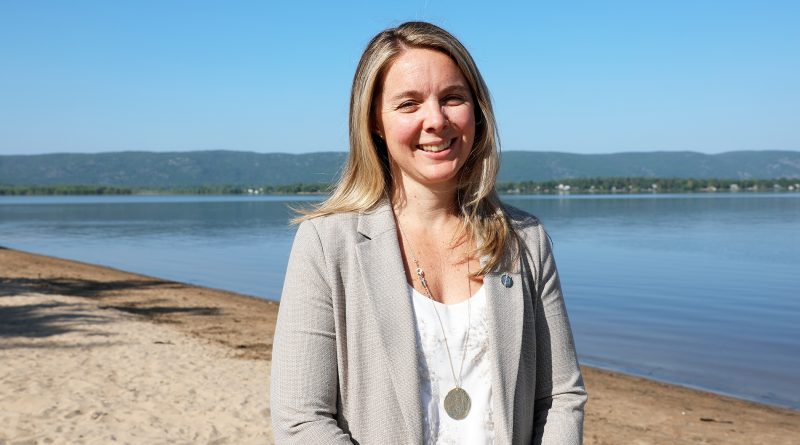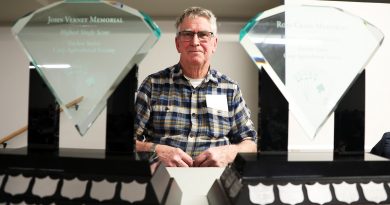Sudds says feds have flood relief role
By Jake Davies - West Carleton Online
(Editor’s note: As we did during the 2017 flood, 2018 tornado, 2019 flood and COVID-19 pandemic, we are making our coverage of potential extreme flooding in 2023 free access to our entire community providing flooding updates, on-site coverage, important information and resources to West Carleton and beyond, so those outside the area can also better understand what is happing in our rural community)
CONSTANCE BAY – While this year’s flood response was primarily handled at the municipal government level, volunteers, and the homeowners themselves, Kanata-Carleton MP Jenna Sudds tells West Carleton Online the federal government does have a role to play as well.
Sudds, while at the time not yet West Carleton’s federal representative, has firsthand experience with the historic flooding West Carleton experienced in 2019.
“In 2019, I was fairly newly elected at the municipal level, and obviously being the neighbouring councillor, myself and my team spent more than a week out here, doing sandbags and whatever we could,” Sudds told West Carleton Online from the Lighthouse Restaurant in Constance Bay May 30. “That experience, as terrible as it was for everyone, for myself gave me such a perspective of what that impact was on so many residents. It was just so devastating.”
Sudds says it also gave her insight to “what the levers the city has.”
“It is really such a massive orchestration the city puts forward,” she said. “With the emergency command centre. I saw the inner workings then. Fast forward now, 2023, I would suggest, working with (Ward 5 councillor) Clarke Kelly, Clarke was fabulous, and we kept in close contact over those weeks. It’s difficult in that it’s a city-orchestrated response. The piece on the federal side during those difficult times, when the water is high, is being ready to help if called upon.”
The call for help goes from the city to the province and then the province to the federal government. This time, that call never came. But now that the water has subsided, Sudds says now is the time to prepare long-term.
“From my vantage point, the work that needs to come now is how do we move forward?” Sudds said. “How do we work collaboratively with all three levels of government, to take whatever steps are necessary to stop this from occurring on a regular basis. I think that’s the big piece now. Let’s identify them and let’s make them, so we’re not in this circumstance year after year.”
Sudds says she’s met with some of her colleagues on the issue including Minister of Public Safety of Canada, Bill Blair and his team.
“Obviously, from a federal perspective it falls to him and his team as far as any response or support the federal government would give,” Sudds said. “On his side, we do have a disaster mitigation fund of $1 billion.”
Sudds is referring to the Disaster Mitigation and Adaptation Fund. Intake for applications opened on Jan. 16 and will remain so until July 19. The fund is available to municipalities to invest in structural and natural infrastructure projects to increase the resilience of communities that are impacted by natural disasters triggered by climate change.
“This is really targeted at municipalities, to invest in projects that are longer term,” Sudds said. “We’ve shared the details of that with Coun. Kelly and Mayor Mark Sutcliffe. They have not made an application at this point in time (May 31), anywhere in the City of Ottawa. But that remains an option if they feel there are investments to be made within their vicinity. We have to recognize a few of the issues come from further up the river.”
Sudds says there is the added challenge of working with another provincial government on the other side of the river, for any projects that focus on the Ottawa River.
“Those are the conversations that need to be happening so we can work together,” Sudds said.
Sudds says there is funding in the 2023 budget introducing a low-cost flood insurance for medium and high-risk homes. The government is also working on an information portal for homeowners and prospective homebuyers to determine their home’s flood and disaster risk.
“The details on that now have to be worked out as to what that will look like,” Sudds said of the insurance program. “But the funding was at least put in the budget, and as we move forward with that, I will be sharing with the community what that will look like.”
While all three governments work towards a solution to the current flooding issues affecting West Carleton and riverside communities across Canada, at least along the Ottawa River, there is still a large number of property owners who believe flooding is a manmade problem due to dam control issues.
“I’ve spoken to Clark about this,” Sudds said. “I think it’s about getting a table together that has representation from all levels of the government as well as the community. I think that piece is really important. But I don’t think it can be just Ottawa representatives. I do think we have to have these conversations with other governments further upstream and potentially other parties as well. We recognize Ontario Power Generation has a role to play in this. There are others, that certainly have a stake in this that should be involved in these conversations.”
On the Quebec side, following 2019 flooding, we saw the provincial government buy up land from homeowners in high-risk areas and forbid people from living in these areas. Sudds says that is not the plan here, and doesn’t think it should be.
“Absolutely agreed,” Sudds said. “That is certainly not my aspiration, nor have I heard that in any conversations or tables I’ve been sitting at, at the federal level. I take that as good news. I think the focus needs to be on the necessary investments that need to be made in the infrastructure up-river particularly to address the issue in a longer-term fashion.”
While the flood response was primarily municipal, Sudds says many West Carleton residents reached out to her office during the spring freshet as well.
“They have certainly been reaching out,” Sudds said. “Because we don’t have a member of provincial parliament, that has certainly exasperated some residents, because they haven’t been able to have these conversations provincially as well. Hopefully that’s rectified that soon, and we’ll be able to have a provincial representative at the table and be able to move forward. The community once again, having this happen for the third time in just a few years, it’s unnerving. It’s impacting their well-being, not only physical, but financial well-being. I sympathize, I understand that, and that’s why I think at this point we have to come together to be able to work towards those longer-term solutions.”











